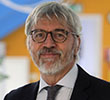Milano-Boston: one click away

Both embarked on their Masters in Management at Università Cattolica del Sacro Cuore in 2018 and after attending courses on campus for some time, they were looking forward to an immersive experience beyond lectures and textbooks. Undecided as to whether to look for an internship in Italy or travel as international students, they undertook some research. They came across Cattolica’s offer of a study-abroad program at Boston University which piqued their interests, but there was a catch which made them think twice: the program would be taught entirely online. They asked all their friends what they knew about studying online and it came out that it was fairly common in the US, either for personal reasons or when students needed to work in order to pay their university fees.
“We were skeptical at first,” says Laura. “It was a huge risk for both of us. Imagine paying so much for courses that you can’t even attend. Moving from on-campus teaching to reading PDFs and answering quizzes online can be quite daunting. Then, it might take a toll on our parents’ too since we would need their full support through the transition, both emotionally and financially. After a lot of reflecting on the pros and cons, and advice from our parents, we decided to enroll.”
One thing that held Laura and Cecilia back at first was the question of the value of online education in the Italian job market. Employers tend to believe that learning from online materials and watching videos by teaching staff, however renowned, are not as effective as face-to-face teaching and learning which allows for interaction with peers and professors. “I think the value of online education to companies who are not yet ready to adapt to the new system is important to talk about,” says Cecilia. “From my online experience, hiring directors don’t mind if a student studies online or on-campus. Most of the universities in the US, and maybe even abroad, offer online degrees as a substitute to the traditional classes. Laura and I were lucky since we were given tons of useful resources throughout the program. They weren’t just to read the materials and answer the quizzes. We had group activities where we needed to talk to other students who were also from different parts of the world. Halfway through the course, we didn’t even know that we were doing the course online. Everything felt synchronous.”
The reputation of a university also tipped the balance. Cattolica has long proven its position as a well-known name to domestic and international students and employers. Its partnership with Boston University means that Laura and Cecilia have been taught by two institutions whose guiding principles are student-centered. “You need to choose a university that cares about you and thinks of your professional career after you receive the diploma,” says Cecilia. “If your learning environment is not responsive to your needs, I don’t think you’ll have a fulfilling experience later on.”
Laura jumps in to echo Cecilia’s thoughts. “Reputation precedes your job search. I’d considered this idea before I enrolled in Cattolica. It’s receptive to what the students need and not in a way where they take actions based on what they think the students need, but they talk to the students, they hear them out, they compile their answers, and they work on solutions to solve the problems.”
Yet both students hope that Italy will widen the range of hiring criteria, not limiting the talent acquisition process to just the name of the university where a student has studied. “The name of the university instantly sparks a certain perspective to some employers in Italy. This can be limiting and at one point, it creates a sort of prejudice. We should steer clear of that norm. Other countries value the experiences and skills of the students. They consider profiles of diverse backgrounds regardless of the institution and whether the student studied online or offline,” says Cecilia.
Speaking of experiences and skills, Laura and Cecilia have accumulated international competences that can catapult their profiles to success. Not only did they need to get to know the ins and outs of apps and online tools that they weren’t familiar with, they also had to communicate with international people in different situations and settings. They had to keep close contact with the other students on the course through voice and video calls, text messages and emails and considering that this involved dealing with different time zones it involved mastering time management skills.
Reading textbooks or journals and taking down notes to prepare for the exams is only part of the overall work done during their online course. Aside from the group projects and individual quizzes, Laura and Cecilia had weekly assignments and deadlines that dovetailed with their study timetables and presentations on business cases. In a nutshell, the distance-learning experience meant they had no option but to sharpen their business-driven mindset in a learning environment which was similar to that of the actual workplace. They played roles that would gear them up to become capable and well-prepared once they move into the workplace in companies.
Working with international groups online had raised the bar of their work ethic, which continued right to the end of the program. They have developed new attitudes towards studying and have become more professional in their approach. They are working well within deadlines, they are contacting and working with other people, they are more confident in speaking up in meetings, they are working faster, and they have become effective communicators.
The online program with Boston University came to a close in March 2020 and Laura and Cecilia are extremely happy that they chose this option. Their experience and the skills that they gained will certainly have a positive effect on the final year of their double degree studies at Cattolica. They are now highly skilled at organizing all aspects of online study, so they are super prepared for the new norm at Cattolica.
“If you’re thinking of doing an online program with the university partners of Cattolica or even remote internships, I’d say jump at it,” says Laura. “You might not be sure at first, but I don’t think you should drop the idea all together. It’s worth trying since it’s not only going to teach you tech skills, but you’ll find yourself in the position where you’ll learn the ropes by asking your teammates and relying on your own skills. It’ll put your knowledge to test and that’s going to toughen you up.”
“That’s true,” says Cecilia as she adjusts her earphones. “Laura and I were not sure at first too, but thanks to our supportive parents and the extra mile of asking around about other people’s experiences, we made a decision that had a lasting impact on us. I’d say do your research, ask anyone who can help you, and just go for it.”
Although they had doubts before they signed up for the online program with Boston University, any uncertainties that Laura and Cecilia felt diminished as they got into the swing of things. The program proved to be a surefire way of acquiring work-centered transferrable skills away from traditional lectures textbook-based cases. They both know that they made a great decision in choosing this experience with Boston University, Cattolica’s partner in the double degree program.




 Paolo Nusiner
Paolo Nusiner